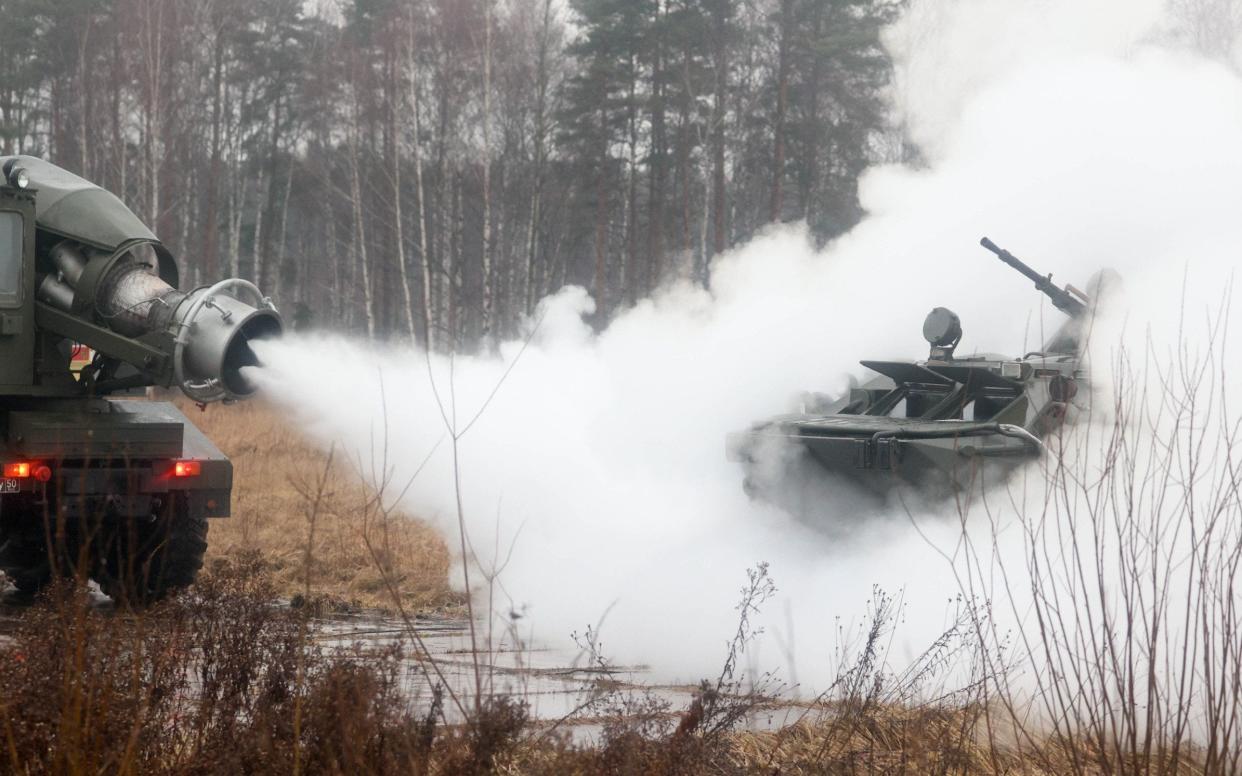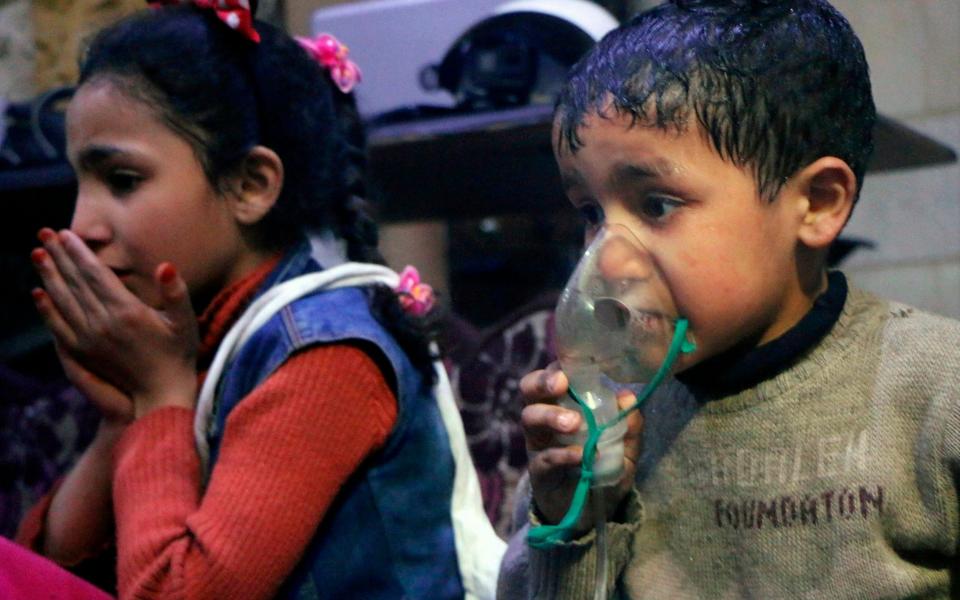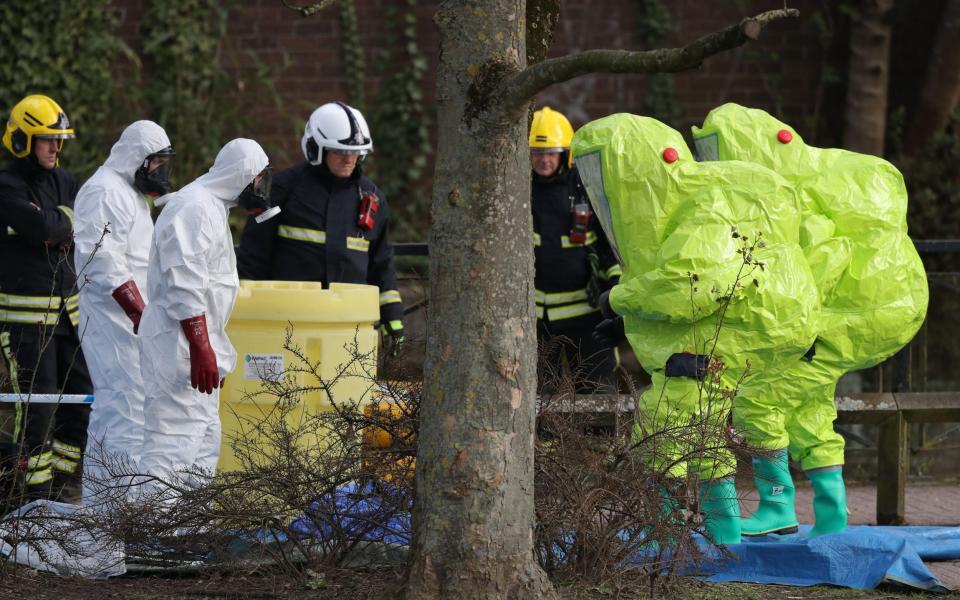Chemical weapons attack by Russia in Ukraine could force Nato to act, warns minister

- Oops!Something went wrong.Please try again later.
Nato could intervene if Vladimir Putin crosses a red line on chemical weapons, a minister has suggested.
James Heappey, the armed forces minister, implied that the alliance could consider a change to its approach if the Russian president was to deploy such weapons in his war on Ukraine.
"I don't think it's helpful to get into any firm commitment right now about where that red line sits," Mr Heappey told BBC Radio 4's Today programme.
"But I think President Putin needs to be very clear about when other countries have used chemical weapons, it has caused an international response.
“I think he should reflect very urgently on what has happened to other countries where they have used this."
However, Downing Street was swift to emphasise that Boris Johnson sees Nato as a "defensive alliance".
The Prime Minister’s spokesman said: "It's obviously the case that we and our allies will continue to monitor the situation closely, considering the history of Russia and its proxies using chemical weapons and the false allegations the Russian government has been making about others developing them."
It came as Britain and the US warned that Russia may use chemical or biological weapons as part of a "false flag" attack on Ukraine.
State-controlled Russian media have been publishing unsubstantiated claims that Ukraine is developing its own biological or chemical weapons. Western intelligence agencies believe this shows that Moscow is laying the groundwork for plausible deniability in the event that it uses banned weapons in its invasion.
Despite signing a treaty banning chemical weapons, the Soviet Union amassed the largest chemical weapons stockpile in the world, including poison gases, paralytic nerve agents such as sarin, and biological agents like anthrax bacteria.
Since its intervention in Syria in 2015, Russia has provided cover and military support for the Syrian government, which has carried out chemical attacks on its civilians.

In August 2012, Barack Obama, the then US president, warned that their use by Bashar al-Assad’s government would be a “red line” for intervention by the United States.
However, ultimately America did not intervene militarily and a year later, Assad's forces subjected the Damascus suburb of Ghouta to a sarin gas attack that killed at least 1,400 people, including women and children.
Ed Arnold, research fellow for European security at the Royal United Services Institute, said that the inability of the US to enforce its “red line” in Syria over chemical weapon use would “absolutely be in Putin’s mind”.
He explained how British MPs were partly to blame for America’s failure to intervene in 2013, saying: “If the UK had backed the use of military intervention, if the Labour party had not blocked it and the government had supported the US position, it would have been highly likely that Obama would have enforced his own red lines.”
West's 'weakness' may have emboldened Putin
Several MPs who either abstained or voted against military intervention in Syria in 2013 told The Telegraph that they now regretted it. One said: “There are plenty of us who have blood on our hands as a result of that vote.”
Tim Farron, the former leader of the Liberal Democrats, who abstained, said: “Assad used chemical weapons on his own people, that is a line you cannot cross, there should have been consequences and there weren't. The lesson that Putin learned from that was they won’t do anything - that has been very dangerous.”
Tom Harris, who was a member of Labour’s shadow cabinet at the time, said that voting against military action was his biggest regret during his 14 years in Parliament.
Writing for this newspaper, he said: “Actions are what matter, and Putin will have been repeatedly reminded of the West’s weakness and cowardice when it came to standing up for Assad’s victims nearly a decade ago.”
However, Steve Baker, the Tory MP, said he remains “proud” of voting against military action in Syria.
He said: “Everyone surely knows that chemical weapons are outrageous weapons of mass destruction. There can be no excuse for Putin to use them. Anyone seeking to minimise his culpability with reference to a House of Commons vote is making a grave mistake.”
Jonathan Powell, former chief of staff to Tony Blair, said failing to act if a stated red line is crossed would be a “catastrophic” appeasement of Putin.
He told BBC Radio 4's World at One programme: "If he crosses one of these red lines, a tactical nuclear weapon, or chemical weapons, I think we should think very seriously indeed if that is a red line for us and we're going to act.”
Russia has been linked to chemical weapons use on several other occasions in recent years, including two on British soil.
Britain accused Russia of using nerve agents to poison a former Russian intelligence officer and his daughter in Salisbury in 2018.

Sergei Skripal, a former double agent for British intelligence, and his daughter Yulia spent weeks in intensive care after being poisoned with what the Porton Down military research centre identified as Novichok, a nerve agent the Soviets developed during the Cold War.
The government announced punitive measures in response to the attempted murders on British soil, including expelling 153 Russian diplomats.
In 2006 Alexander Litvinenko, a former Russian intelligence agent, was poisoned by polonium-210 in London. Litvinenko had fled to the UK after becoming an outspoken critic of Putin and accusing the Russian government of corruption.
After his death, Scotland Yard said that evidence suggested the Russian state was behind the poisoning. In September last year, the European Court of Human Rights ruled that Moscow was responsible, ordering it to pay compensation to Mr Litvinenko’s widow.

